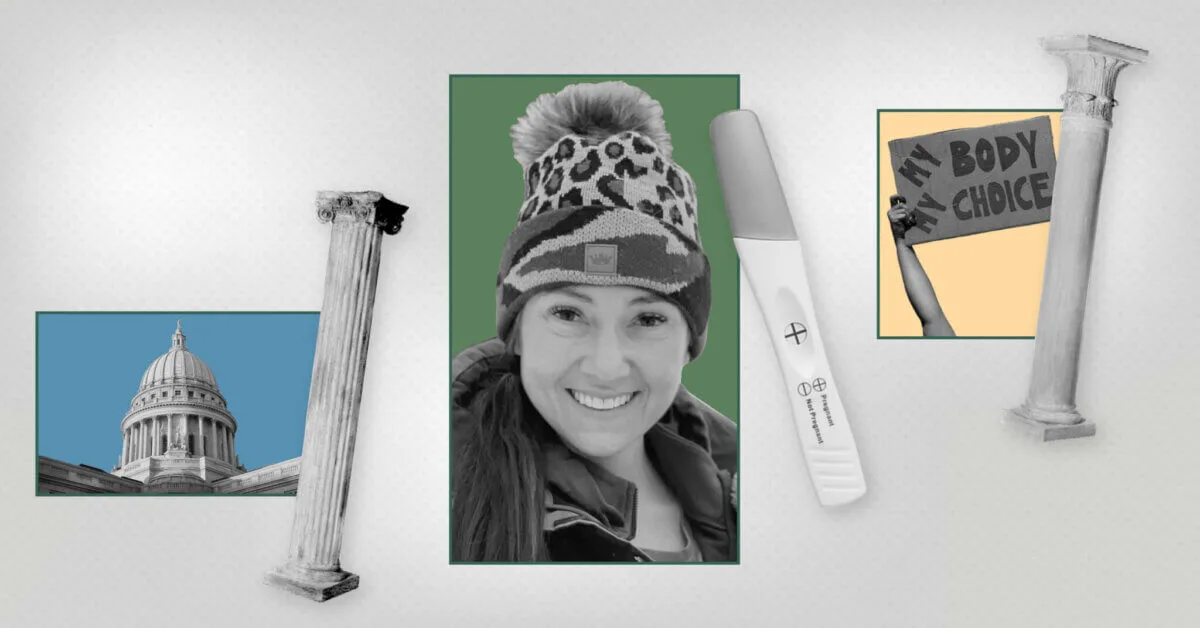
Graphic by Desiree Tapia; photo courtesy of Anna Igler
Anna Igler was excited to have a daughter, but devastating fetal abnormalities led her to have an abortion at 25 weeks. Now, Igler is speaking out about the importance of voting in the April 4 Wisconsin Supreme Court election in order to help overturn the state’s 1849 abortion ban.
Anna Igler was over the moon when she found out she was pregnant with her second child.
It was Mother’s Day 2020 when the Brown County resident found out she’d be a mother to a second baby, who would join her then one-year-old son.
“From the moment I first saw my positive pregnancy test, I loved my child,” Igler said.
Igler’s pregnancy was going great; the results of her 20-week ultrasound were normal. She thought she was in the clear, and was excited to have a daughter.
“I thought I was going back to a routine anatomy scan at 24 weeks. I had an extra scan at this point just because I’m over 35, and I saw that something was really wrong, and I know because I’m an obstetrician and that’s what I do. I read ultrasounds all day,” Igler said.
The fetus’ head measurements were smaller than that of the first percentile, which is exceedingly abnormal.
“I started crying during the ultrasound, and my husband was with me and he looked really confused because he didn’t know why I was crying,” Igler said.
The fetus was suffering from microcephaly, a condition where the head is significantly smaller than expected, usually due to brain development issues. Igler’s doctor drew amniotic fluid from her uterus for testing. Two days later, her doctor called her with the results.
“When he told me what was going on, I knew my daughter was doomed,” Igler said.
The test came back positive for a virus called cytomegalovirus, or CMV, a common childhood infection. Igler believes she got the infection from her son—who likely got it from his daycare program—before unknowingly passing it along to her fetus. She didn’t even know she was sick, and there’s no vaccine for CMV.
Due to her work as an OB/GYN, Igler knew the prognosis with a CMV infection and microcephaly is dismal; the fetus’ brain has been infected and permanently damaged.
“There will be cognitive impairment, probably severe. There will be deafness, possible blindness. It can infect other organs like the liver, like the bone marrow, it can infect other organ systems. It can cause a stillbirth where the baby dies inside the womb,” Igler said. “I had no good option.”
Igler did the only thing she felt she could do.
“I chose the merciful thing. I chose to have an abortion at 25 weeks,” she said. “My husband and I chose that together because we wanted mercy and we didn’t want our daughter to suffer.”
It was important to Igler that she and her husband were able to make the decision to have an abortion on their own terms, with guidance from her physician.
“That’s what this decision should be about. It shouldn’t be up to anybody else,” Igler said.
She was too far along to have an abortion in Wisconsin, which at the time, did not allow abortions after 22 weeks. So in September 2020, Igler flew to Colorado to have her abortion.
Igler, now 40, has since given birth to a second child, but will always love the daughter she never got to raise.
“We named her Nora Rose. I named her after my mom, my mom’s middle name,” Igler said. “And when I was a little girl, I wanted my name to be Rose. So that’s what we named her, and I’ll always miss her. Always.”
Wisconsin’s 1849 Ban Is Wreaking Havoc on Women and Doctors
While 99% of abortions are performed in the first 21 weeks, situations like Igler’s, where the fetus experiences catastrophic and likely fatal abnormalities, occur thousands of times a year in the United States.
“I think a lot of people don’t understand why somebody might choose an abortion in the second trimester, but my situation is a primary example of why people do,” she said. “I had all of the right prenatal care. I didn’t do anything wrong. It just is something really, really bad and terrible that happened to me, and other really bad, terrible stuff happens in pregnancy.”
This is why Igler believes abortion care should be available to all women.
But now, following the US Supreme Court’s decision last summer to overturn Roe v. Wade, women’s reproductive freedom has been drastically limited in dozens of states across the country, including Wisconsin, where an extreme 1849 law that bans abortion and makes no exceptions for cases of rape or incest is in effect.
Under the ban, abortions are only allowed in order to save the mother’s life, and even then, only when it “is advised by 2 other physicians as necessary, to save the life of the mother.”
Any doctor who performs any other kind of abortion in violation of the law can be charged with a felony and face up to six years in prison and $10,000 in fines. The confusing language in the law text has created a chilling effect among doctors, according to Dr. Kristin Lyerly, an OB/GYN who also lives in Brown County.
“It’s a felony if I’m accused of providing an abortion and taking care of my patient. It’s put a giant barrier between doctors and patients. Doctors don’t know what we can do,” Lyerly said. “And patients, because of the chilling effect, don’t know what they can and can’t receive or ask for. They’re afraid to ask questions, they’re afraid to seek treatment, and they’re stuck in this world of fear and misinformation.”
Lyerly worries that the confusion surrounding the law could even prove fatal.
“If you’re the patient and you’re sitting there waiting to check these boxes because you’re not sick enough yet, or because you need one more doctor to sign on before somebody can save your life, that’s not good patient care. That could absolutely cost someone their life,” she said.
That’s what life is like for women in Wisconsin right now. But the state could soon restore women’s reproductive freedom, depending on the outcome of the April 4 state Supreme Court election between liberal candidate Janet Protasiewicz and right-wing judge Dan Kelly.
Wisconsin’s Supreme Court Election Could Restore Reproductive Freedom
Wisconsin Attorney General Josh Kaul filed a lawsuit last summer, asking the Dane County Circuit Court to overturn the 1849 ban and instead rule that a 1985 state law that bans abortions after a fetus becomes viable outside the womb—usually around 24 weeks—supersedes the pre-Civil War era ban.
The Dane County court has yet to issue a ruling and the lawsuit is expected to reach the state Supreme Court, which is currently made up of a 4-3 Republican majority.
Protasiewicz supports reproductive freedom and believes “in a woman’s freedom to make her own decision on abortion.” If she wins, the pre-Civil War era ban could be struck down, and the 1985 law implemented in its place.
Kelly, meanwhile, has described abortion as “a policy that has as its primary purpose harming children” and accused advocacy groups and Democrats of “normalizing the practice of abortion, making it culturally acceptable” in order to “preserve sexual libertinism.”
“If my opponent is elected, I can tell you with 100% certainty that [the] 1849 abortion ban will stay on the books,” Protasiewicz said during a debate with Kelly on Tuesday.
Igler agrees and thinks Kelly is an “extremist” who needs to be kept off the Court.
“We know how he’s going to vote on it because he’s supported by major [anti-abortion] organizations in our state,” she said.
Kelly has been endorsed by Wisconsin Family Action, Pro-Life Wisconsin, and Wisconsin Right to Life, and has previously provided legal advice to Wisconsin Right to Life.
“No one else should be deciding what someone does with their own body, so whether you like it or not, the government doesn’t belong, in any way, shape or form, making a medical decision for someone else,” Igler said.

What Will Happen if Dan Kelly Wins
Igler has witnessed the severe consequences of the 1849 law first-hand and is devastated to think about what it will mean for women if Kelly wins and upholds the ban.
“Women are scared,” she said. “Women have been requesting more sterilization procedures, and in the office, they actually come in worried that I won’t give them what they’re asking for, which is horrifying. They’re scared to come into a doctor’s office.”
Patients have asked her if she’ll treat miscarriages with standard medical care and whether she’s pro-choice, because they fear a doctor who isn’t won’t present them all their options if they have complications during their pregnancy.
And if pregnant women do have complications like Igler did, the ban makes the process of getting treatment a traumatizing one.
“If we have a patient who has a devastating medical diagnosis for their baby in pregnancy, we have to tell them first—which no one is expecting—and then we have to send them out of state, hours and hours away. Just imagine the trauma in that, I know because I experienced it,” she said. “The money, the time off of work, the arranging.”
The ban is also causing havoc on the provider side. Because of the law’s extreme restrictions on doctors, Lyerly spends two to three weeks a month in Minnesota, a seven-hour drive away from her family, where she can provide abortion care without fear of prosecution.
According to Lyerly, even doctors whose specialties have nothing to do with reproductive healthcare are worried that the ban could cost them their jobs or lead to prosecution.
“Emergency medicine doctors, they’re the ones who are there when women come in bleeding and are suffering a miscarriage or have an ectopic pregnancy, and they’re very uncomfortable,” Lyerly said. “They don’t have time to talk with other colleagues and to convene the ethics panel and try to figure it out, call a lawyer—they don’t have time. They have to treat the patient.”
She’s even heard of radiologists and cardiologists being concerned that if they do an ultrasound and put their name on the patient’s report, they could be held liable if an abortion is performed that later comes under scrutiny. These fears are driving many doctors from different specialties and backgrounds to make plans to leave Wisconsin, Lyerly said.
What’s most worrisome though is the impact a Kelly win could have on the lives of pregnant women themselves. If the ban stays in place, Igler fears that necessary abortions for women with life-threatening conditions will continue to be delayed.
“Women will get hurt. They will get sicker than they should, and women will die. It’s scary,” Igler said. “And my patients worry that birth control is next … I’m not even kidding you.”
The consequences of the 1849 ban are why Igler is urging voters to vote with reproductive freedom in mind on April 4.
“Somebody you love might struggle with a pregnancy like I did,” she said. “Your sister or your child, your daughter or your friend, your best friend or your neighbor. Sometimes really bad things happen to people, so think of that person and go out and vote for them and yourself to be able to make your own medical decisions. This is about the autonomy of making your own medical decision, and everybody should be able to do that for themselves. And if it’s not you right now, it’ll be you in the future.”

Opinion: Many to thank in fair maps victory for Wisconsinites
On February 19, 2024, Governor Tony Evers signed into law new and fair state legislative maps, bringing hope for an end to over a decade of...

Opinion: Empowering educators: A call for negotiation rights in Wisconsin
This week marks “Public Schools Week,” highlighting the dedication of teachers, paras, custodians, secretaries and others who collaborate with...

Op-ed: Trump’s journey from hosting The Apprentice to being the biggest loser
Leading up to the 2016 election, Donald Trump crafted an image of himself as a successful businessman and a winner. But in reality, Trump has a long...

Not just abortion: IVF ruling next phase in the right’s war on reproductive freedom
Nearly two years after the US Supreme Court overturned Roe v. Wade, another court is using that ruling to go after one of the anti-abortion right’s...




